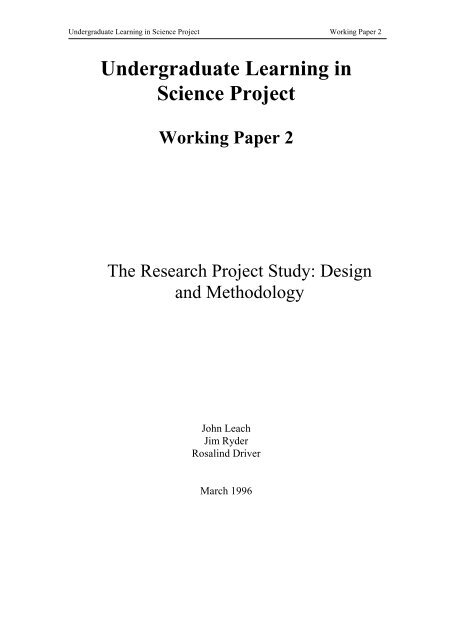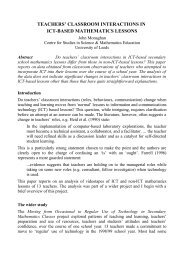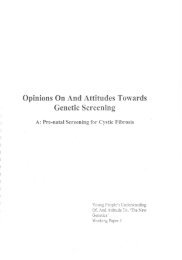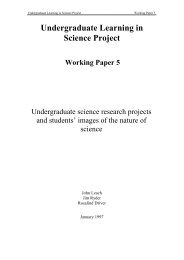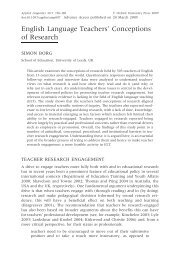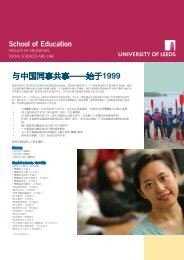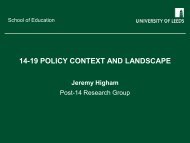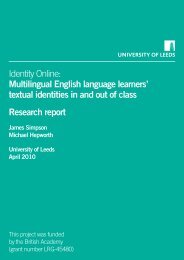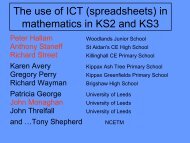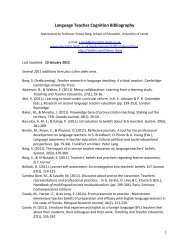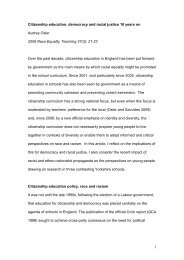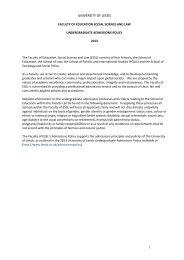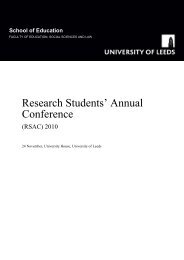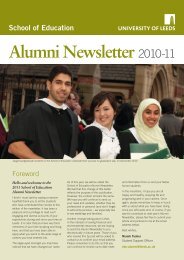The Research Project Study: Design and Methodology - School of ...
The Research Project Study: Design and Methodology - School of ...
The Research Project Study: Design and Methodology - School of ...
You also want an ePaper? Increase the reach of your titles
YUMPU automatically turns print PDFs into web optimized ePapers that Google loves.
Undergraduate Learning in Science <strong>Project</strong> Working Paper 2Undergraduate Learning inScience <strong>Project</strong>Working Paper 2<strong>The</strong> <strong>Research</strong> <strong>Project</strong> <strong>Study</strong>: <strong>Design</strong><strong>and</strong> <strong>Methodology</strong>John LeachJim RyderRosalind DriverMarch 1996
Undergraduate Learning in Science <strong>Project</strong> Working Paper 2<strong>The</strong> Undergraduate Learning in Science <strong>Project</strong> is currently funded within theUniversity <strong>of</strong> Leeds by:<strong>The</strong> Academic Development FundDepartment <strong>of</strong> Biochemistry & Molecular BiologyDepartment <strong>of</strong> ChemistryDepartment <strong>of</strong> Earth SciencesDepartment <strong>of</strong> EducationDepartment <strong>of</strong> Genetics.John Leach is a Lecturer in Science Education at the Learning in Science <strong>Research</strong>Group, Centre for Studies in Science <strong>and</strong> Mathematics Education, <strong>School</strong> <strong>of</strong>Education, University <strong>of</strong> Leeds.Jim Ryder is a <strong>Research</strong> Fellow at the Learning in Science <strong>Research</strong> Group, Centrefor Studies in Science <strong>and</strong> Mathematics Education, <strong>School</strong> <strong>of</strong> Education, University <strong>of</strong>Leeds.Rosalind Driver is Pr<strong>of</strong>essor <strong>of</strong> Science Education at the <strong>School</strong> <strong>of</strong> Education, King’sCollege, London.Further copies <strong>of</strong> this paper <strong>and</strong> others in the series are available from:Centre for Studies in Science <strong>and</strong> Mathematics Education<strong>School</strong> <strong>of</strong> EducationUniversity <strong>of</strong> LeedsLeedsLS2 9JTUnited KingdomISBN: 0-904-42173-2March 1996© Copyright
Undergraduate Learning in Science <strong>Project</strong> Working Paper 2<strong>The</strong> <strong>Research</strong> <strong>Project</strong> <strong>Study</strong>: <strong>Design</strong> <strong>and</strong><strong>Methodology</strong>Abstract<strong>The</strong> Undergraduate Learning In Science <strong>Project</strong> (ULISP) started at theUniversity <strong>of</strong> Leeds in September 1994. <strong>Project</strong> members include educationalresearchers, lecturing staff within various science departments <strong>and</strong> others withinterests in teaching <strong>and</strong> learning at the undergraduate level. <strong>The</strong> aim <strong>of</strong> the<strong>Project</strong> is to inform underst<strong>and</strong>ing <strong>of</strong> science teaching <strong>and</strong> learning at theundergraduate level, through a variety <strong>of</strong> research activities.<strong>The</strong> <strong>Research</strong> <strong>Project</strong> <strong>Study</strong> was a two year ULISP research investigation int<strong>of</strong>inal year undergraduates experiences during project work. <strong>The</strong> results <strong>of</strong> thisresearch study are reported in ULISP working papers 2 to 8.This paper describes the design <strong>and</strong> methodology <strong>of</strong> the research project study.A case is made for the action research design <strong>of</strong> the study, <strong>and</strong> the collection <strong>of</strong>data in the particular context <strong>of</strong> final year research projects. <strong>The</strong> methodologicalstrengths <strong>and</strong> limitations <strong>of</strong> the study are discussed. Finally, the interviewschedules used for data collection with both students <strong>and</strong> supervisors arepresented <strong>and</strong> justified.Acknowledgements<strong>The</strong> authors would like to thank all <strong>of</strong> the many science lecturers <strong>and</strong> sciencestudents who have contributed to the work <strong>of</strong> the Undergraduate Learning inScience <strong>Project</strong>.Groups in departments were coordinated by:Pr<strong>of</strong>. Joe CannDr. Alan RadfordPr<strong>of</strong>. Steve ScottDr. Ed WoodDepartment <strong>of</strong> Earth SciencesDepartment <strong>of</strong> GeneticsDepartment <strong>of</strong> ChemistryDepartment <strong>of</strong> Biochemistry & Molecular Biology
Undergraduate Learning in Science <strong>Project</strong> Working Paper 2Contents1 Introduction 12 Description <strong>of</strong> the study 23 <strong>Methodology</strong> 43.1 Methodological commitments 43.1.1 Action research 43.1.2 Contexts for data collection 53.2 Sources <strong>of</strong> data used to address each <strong>of</strong> the research questions 73.3 <strong>The</strong> design <strong>of</strong> the data collection instruments 73.3.1 Interview schedules for use with project students 73.3.2 Log books for use with project students 93.3.3 Interview schedules for use with project supervisors 93.3.4 Workshop activities for use with project supervisors 103.3.5 Informal visits to students 113.3.6 Information collected from participating departments 113.4 Approach to data analysis 114 Methodological critique <strong>of</strong> the study 135 Appendices 145.1 Interview schedules used with project students <strong>and</strong> information on thecompletion <strong>of</strong> log books 145.1.1 Interview I: Administered at the beginning <strong>of</strong> projects 145.1.2 Interview II: Administered once project work was well underway 155.1.3 Interview III: Administered once project reports had beencompleted 165.1.4 Information on the completion <strong>of</strong> log books 185.2 Interview schedule used with project supervisors 205.3 Workshop activities undertaken during ULISP 225.4 ULISP Working Papers 24
Undergraduate Learning in Science <strong>Project</strong> Working Paper 21 IntroductionMost undergraduate science courses in the United Kingdom include a project<strong>of</strong> some kind during the final year. Although different institutions <strong>and</strong>departments organise project work differently, the majority involve studentsin undertaking original research work on novel problems, with a view tointroducing undergraduate science students to the actual practice <strong>of</strong> scientificresearch.In Working Paper 1 we described our particular interest in the ways in whichstudents learn about the actual practice <strong>of</strong> science during undergraduatecourses. For many students, the final year research project is the first timewhen actual scientific research is encountered; we therefore identified thefinal year project as an important teaching context for enculturing studentsinto the culture <strong>of</strong> scientific research.This interest in learning about the actual practice <strong>of</strong> science was developedduring informal discussions <strong>and</strong> workshop activities involving the variousparticipants in ULISP: science educators, lecturers from various sciencedepartments <strong>and</strong> others with an interest in teaching <strong>and</strong> learning at theundergraduate level. Three broad aims for the investigation <strong>of</strong> researchprojects in the undergraduate curriculum were identified:• To characterise the various learning aims identified for undergraduateproject work by departments, research project supervisors, <strong>and</strong> students.• To characterise the nature <strong>of</strong>, <strong>and</strong> interactions between, the followingaspects <strong>of</strong> undergraduate research projects:- the learning experienced by students;- the teaching/supervision approaches used by departmental staff;- the departmental administration <strong>of</strong> research projects; <strong>and</strong>- the departmental approach to the assessment <strong>of</strong> research projects.• To evaluate research projects as teaching <strong>and</strong> learning activities onundergraduate courses, in terms <strong>of</strong> the learning aims identified.<strong>The</strong> methodology used to address these questions is described later in thispaper. Firstly, however, the design <strong>of</strong> the study is described.1
Undergraduate Learning in Science <strong>Project</strong> Working Paper 22 Description <strong>of</strong> the study<strong>The</strong> study focused upon the final year research projects <strong>of</strong> 12 students fromthe departments <strong>of</strong> biochemistry <strong>and</strong> molecular biology, chemistry, genetics<strong>and</strong> earth sciences at the University <strong>of</strong> Leeds. Each project was completedby one student working alone, though <strong>of</strong>ten within a group <strong>of</strong> other studentsor researchers. Data were collected from the students themselves, theirsupervisors, <strong>and</strong> the departments hosting the projects. 1A longitudinal design was used for data collection from students, eachstudent being interviewed at the beginning <strong>of</strong> the project, at a point whenwork was well underway, <strong>and</strong> once the written report <strong>of</strong> the project wascompleted. Students were also visited informally while working on theirprojects. In addition, students were asked to keep a journal throughout theduration <strong>of</strong> their projects. Copies <strong>of</strong> the interview schedules used withstudents, <strong>and</strong> the information provided concerning the use <strong>of</strong> journals, can befound in appendix 1.<strong>Project</strong> supervisors were interviewed once, when students’ project reportshad been completed <strong>and</strong> were in the process <strong>of</strong> being marked. <strong>The</strong> interviewschedule administered to supervisors can be found in appendix 2. Furtherdata about departmental policies <strong>and</strong> practices in administering <strong>and</strong> assessingresearch projects were collected through a workshop activity involvingproject supervisors from each department (see appendix 3).Written data were also collected from departments relating to administrativeprocedures <strong>and</strong> the assessment <strong>of</strong> projects. In particular, departmentalguidelines on the assessment <strong>of</strong> projects were collected, as was any writteninformation produced for students about completing projects or projectreports.Table 1 summarises information about the sample used in the study:Table 1: <strong>The</strong> sample used for the research project studyDepartment Number <strong>of</strong> projects Number <strong>of</strong> supervisorscovering these projectsBiochemistry & 3 3Molecular BiologyChemistry 2 1Earth Sciences 4 4Genetics 3 31 A questionnaire survey <strong>of</strong> students (N~250) <strong>and</strong> supervisors (N~120) has recently been designed <strong>and</strong>will be administered in May 1996.2
Undergraduate Learning in Science <strong>Project</strong> Working Paper 2Of the above students, 7 were female <strong>and</strong> 5 were male. 10 supervisors weremale, 1 was female. <strong>The</strong> sample was identified in order to span theparticipating departments. Examination performance was used bydepartments to select students across the ability spectrum for inclusion in thesample, though no attempt was made to reflect ability in a systematic waydue to the small numbers involved.In this series <strong>of</strong> working papers, the comments <strong>of</strong> students <strong>and</strong> supervisorsare treated anonymously.3
Undergraduate Learning in Science <strong>Project</strong> Working Paper 23 <strong>Methodology</strong>3.1 Methodological commitments<strong>The</strong> design <strong>of</strong> this study is underpinned by two methodologicalcommitments:• a commitment to an action research approach, in which lecturingstaff <strong>and</strong> educational researchers work collaboratively oninvestigating the practice <strong>of</strong> teaching <strong>and</strong> learning at theundergraduate level;• a commitment to investigating student learning in actual teachingcontexts.3.1.1 Action researchSomekh (1995) 2 describes action research as:‘(...) rejecting the concept <strong>of</strong> a two-stage process in which researchis carried out first by researchers <strong>and</strong> then in a separate secondstage the knowledge generated from the research is applied bypractitioners. Instead, the two processes <strong>of</strong> research <strong>and</strong> action areintegrated.’(p.340)As described in working paper 1, this project emerged from a concern on thepart <strong>of</strong> undergraduate science lecturers to improve their students’underst<strong>and</strong>ing <strong>of</strong> ‘the actual practice <strong>of</strong> science’. Addressing this issueinvolves identifying what might be meant by ‘the actual practice <strong>of</strong> science’,the extent to which such meanings are shared by the various stake-holders inundergraduate science education, the contexts in which students get theopportunity to learn about the actual practice <strong>of</strong> science <strong>and</strong> the sorts <strong>of</strong>interactions that are involved in promoting learning in such contexts. <strong>The</strong>process <strong>of</strong> making the learning aims <strong>of</strong> teaching contexts explicit, <strong>and</strong>characterising the learning resulting from such teaching, is an importantfactor in producing improvements in practice. <strong>The</strong> validity <strong>of</strong> action researchis evaluated through a constant cycle involving appraising the effectiveness<strong>of</strong> changes in practice, <strong>and</strong> communication <strong>of</strong> findings through formal <strong>and</strong>informal channels (Somekh, 1995). It is worth noting that this evaluationdraws upon the practical usefulness <strong>of</strong> the research, rather than by referenceto externally generated criteria.We describe this project as an action research project because practitioners<strong>and</strong> educational researchers were jointly involved in identifying the researchproblems, designing <strong>and</strong> critiquing data collection instruments <strong>and</strong> analysis,<strong>and</strong> identifying findings. This was achieved through a series <strong>of</strong> workshops2 Somekh B (1995) <strong>The</strong> contribution <strong>of</strong> action research to development in social endeavours: aposition paper on action research methodologyBritish Educational <strong>Research</strong> Journal 21 (3) 339-3554
Undergraduate Learning in Science <strong>Project</strong> Working Paper 2involving ULISP participants. <strong>The</strong> education researchers involved in theproject organised these workshops, based on the priorities identified by thewhole group. At different times during the project, workshops focused ondata collection, data analysis, <strong>and</strong> identifying areas for further research(appendix 3). In addition, some workshops involved collecting data fromparticipants on issues such as the perceived purposes <strong>of</strong> research projects inthe undergraduate course. An illustration <strong>of</strong> the way in which this actionresearch project was conducted can be found in section 3.3.4.Each <strong>of</strong> the papers in this series has been made available for comment byULISP participants. <strong>The</strong> content <strong>and</strong> style <strong>of</strong> the papers have been writtenwith a number <strong>of</strong> possible users in mind. <strong>The</strong> main users are likely to beULISP participants, whether science lecturers or science educationresearchers. An attempt has been made to produce as full an account <strong>of</strong> theproject as possible for this audience, with summaries being used asappropriate for readers whose interests are more related to implications forpractice than the research basis <strong>of</strong> findings. It is hoped that other sciencelecturers will find this approach to reporting the work useful <strong>and</strong> accessible.A further audience for the papers is the science education researchcommunity, <strong>and</strong> we have therefore made explicit the theoretical grounding <strong>of</strong>our work. Future publication plans include articles for the science educationresearch community.3.1.2 Contexts for data collectionSo far, the Undergraduate Learning in Science <strong>Project</strong> has investigated theways in which undergraduate scientists go through the process <strong>of</strong> ‘becominga scientist’ in two curricular contexts, namely final year research projects <strong>and</strong>first <strong>and</strong> second year tutorials. <strong>The</strong>se contexts were selected because theirprimary purpose was to teach about the actual practice <strong>of</strong> science (seeworking paper 1). Matthews (1994) 3 has argued that science educationshould include explicit teaching <strong>of</strong> the history <strong>and</strong> philosophy <strong>of</strong> science, inorder to enhance underst<strong>and</strong>ing <strong>of</strong> particular scientific ideas, <strong>and</strong> documentsa number <strong>of</strong> approaches to science teaching in which historical <strong>and</strong>/orphilosophical subject matter is covered. But there is evidence that scientistshold different views <strong>of</strong> ‘the nature <strong>of</strong> science’ in general, the nature <strong>of</strong>science in their own disciplines, <strong>and</strong> the nature <strong>of</strong> science in their own work(Samarapungavan, 1992) 4 . Our interest is upon the ways in whichundergraduates become encultured into their own disciplines <strong>and</strong> for thisreason, our focus is upon documenting students’ underst<strong>and</strong>ings <strong>of</strong> the actualpractice <strong>of</strong> science within their own disciplines <strong>and</strong> in the context <strong>of</strong> theirown investigative work.A range <strong>of</strong> information <strong>and</strong> data was used to inform the study. Ourperspective on teaching <strong>and</strong> learning science at the undergraduate level was3 Matthews M R (1994) Science Teaching: <strong>The</strong> role <strong>of</strong> history <strong>and</strong> philosophy <strong>of</strong> science (Routledge)4 Samarapungavan A (1992) Scientists conceptions <strong>of</strong> science: a study <strong>of</strong> epistemic beliefsPaper presented at the AERA Annual Meeting San Francisco April 19925
Undergraduate Learning in Science <strong>Project</strong> Working Paper 2informed in part by published literature on science education, as cited inworking paper 1.As already mentioned, the bulk <strong>of</strong> the data for the research project study werecollected around a longitudinal study <strong>of</strong> 12 research projects in whichstudents were interviewed at the beginning <strong>of</strong> their projects, at a point whenwork was well underway, <strong>and</strong> at the end <strong>of</strong> the project when reports had beencompleted. <strong>The</strong>se interviews were timed so that particular aspects <strong>of</strong> ourresearch questions could be addressed at points when they were most likelyto be on students’ minds (see section 3.3.1). A longitudinal design was usedso that we would be able to comment upon the interacting factors in researchprojects <strong>and</strong> their possible roles in promoting learning (Leach et al 5 ). It wasacknowledged that important events for project students might occurbetween interviews, <strong>and</strong> might subsequently be forgotten by students beforethe next interview. For this reason, students were asked to keep a diary forthe duration <strong>of</strong> their projects, <strong>and</strong> these were passed to interviewers beforeinterviews so that interesting issues could be followed up. A number <strong>of</strong>informal visits to project students were also made with the aim <strong>of</strong> identifyingimportant happenings in the research projects, <strong>and</strong> to get a sense <strong>of</strong> thestudents’ working environments. Each interview with a given student wascarried out by the same researcher, two researchers covering the 12 projectstudents. Interviews were carried out in a private <strong>of</strong>fice, <strong>and</strong> were taperecorded <strong>and</strong> transcribed in full. <strong>The</strong>se transcripts comprised the data sourcefor interviews with students. A number <strong>of</strong> early interviews were observed byanother researcher, to ensure consistency <strong>of</strong> approach.<strong>Project</strong> supervisors were also interviewed. It was only deemed necessary toconduct one interview with supervisors in addressing our research questions(see section 3.3.3). Interviews were carried out in private, <strong>and</strong> audio-taped infull. Each project supervisor was interviewed by the researcher who hadinterviewed the project student. Some interviews were observed by anotherresearcher. Again, the data source for these interviews were the fulltranscripts <strong>of</strong> the interviews.Some aspects <strong>of</strong> our research questions related to departmental procedures<strong>and</strong> policies, particularly in the area <strong>of</strong> project assessment. Writtendepartmental procedures relating to research projects were collected, <strong>and</strong>some workshop time was allocated to discussing the procedures followed inparticular departments (see sections 3.3.4 <strong>and</strong> 3.3.6).It is recognised that written or espoused policies on project administration<strong>and</strong> assessment may differ from actual practice. For this reason, a number <strong>of</strong>different data sources were used in addressing several aspects <strong>of</strong> our researchquestions, as described in the next section.5 Leach J, Driver R, Millar R <strong>and</strong> Scott P (1995) Progression in Learning about ‘the Nature <strong>of</strong>Science’: Issues <strong>of</strong> Conceptualisation <strong>and</strong> <strong>Methodology</strong> Chapter 5 in Progression in Learninged. Mark Hughes BERA Dialogues 11 (Multilingual Matters Ltd) ISBN 1-85359-309-56
Undergraduate Learning in Science <strong>Project</strong> Working Paper 23.2 Sources <strong>of</strong> data used to address each <strong>of</strong> the research questions<strong>The</strong> first research question relates to the learning aims identified for projects.A number <strong>of</strong> questions were written into interview schedules in order tocharacterise the various learning aims identified for undergraduate projectwork by supervisors <strong>and</strong> students. Also, written information about the aims<strong>of</strong> project work was collected from departments <strong>and</strong> lecturers reported theirdepartments’ policies as well as their personal views at workshops.<strong>The</strong> second research question <strong>of</strong> the study involved characterising the nature<strong>of</strong>, <strong>and</strong> interactions between, the following aspects <strong>of</strong> undergraduate researchprojects:• the learning experienced by students;• the teaching/supervision approaches used by departmental staff;• the departmental administration <strong>of</strong> research projects; <strong>and</strong>• the departmental approach to the assessment <strong>of</strong> research projects.Information from interviews, workshops <strong>and</strong> departmental policies was usedto make this characterisation.<strong>The</strong> final research question involves evaluating projects as teaching <strong>and</strong>learning experiences for students. <strong>Research</strong> projects were evaluated asteaching <strong>and</strong> learning activities on undergraduate courses by ULISP membersin terms <strong>of</strong> the learning aims identified above, <strong>and</strong> the perspective onteaching <strong>and</strong> learning described in working paper 1. To this extent, all datasources <strong>and</strong> literature on science education were drawn upon in making theseevaluations.3.3 <strong>The</strong> design <strong>of</strong> the data collection instrumentsData collection instruments were used in this study to address the first tworesearch questions. <strong>The</strong> evaluation identified for the final research questioncan only be started once the first two research questions have been addressed,<strong>and</strong> no specific data were collected in the context <strong>of</strong> this question.3.3.1 Interview schedules for use with project studentsSome aspects <strong>of</strong> the research questions were deemed more appropriate toaddress with students at the beginning, the middle, or the end <strong>of</strong> theirresearch projects. Three interview schedules were therefore prepared, withdifferences in focus, <strong>and</strong> administered at different times in the projects.It was anticipated that students’ views about a number <strong>of</strong> aspects <strong>of</strong> researchproject work might change as their projects progressed, <strong>and</strong> questions onthese issues were therefore included in the first <strong>and</strong> third interview, or allthree interviews. For example, students were asked about their views <strong>of</strong>ideal project supervision in each interview, as the role <strong>of</strong> the supervisormight be different at different points in the project. In other cases, it was feltthat there were good reasons to assume that students’ views might remain7
Undergraduate Learning in Science <strong>Project</strong> Working Paper 2fairly constant <strong>and</strong> that questions could be included in only one <strong>of</strong> theinterview schedules. For example, it was not felt necessary to ask studentsabout the process <strong>of</strong> project allocation after the first interview.In each interview, a number <strong>of</strong> general questions were included to give theinterviewer a feel for the context <strong>of</strong> the project. For example, questions onthe scientific context <strong>of</strong> the project were included at various points, as werequestions about the environments in which students were working <strong>and</strong> therelationships between project work <strong>and</strong> other commitments. In particular,the second interview related to the details <strong>of</strong> particular research projects.Students’ views <strong>of</strong> the aims <strong>of</strong> projects in the undergraduate course wereprobed in interview I sections A-D, <strong>and</strong> in interview III section A. Studentsoverwhelmingly identified the aim <strong>of</strong> undergraduate projects as introducingthem to ‘real’ scientific research in interview I, <strong>and</strong> for this reason questionA2 was phrased in these specific terms in interview III.Students’ views about the ideal supervision <strong>of</strong> projects were probed ininterview I section B, interview II section D, <strong>and</strong> interview III section C.<strong>The</strong>ir views about project assessment were probed at the outset <strong>of</strong> projects(interview I section B), <strong>and</strong> once project reports were in the process <strong>of</strong>marking (interview III section C). Views about the process <strong>of</strong> allocatingstudents to projects were probed in interview I section B.A major focus <strong>of</strong> the interviews with students was upon their enculturationinto the world <strong>of</strong> scientific research within their disciplines. In order tocharacterise this process, interview questions were designed which related tostudents’ prior expectations about what completing a research project mightinvolve (interview I sections A, C, D <strong>and</strong> E) <strong>and</strong> their views about what wasactually involved having completed the project (interview III sections A <strong>and</strong>D). Also, interview II addressed the nature <strong>of</strong> research activities actuallybeing undertaken as part <strong>of</strong> the project (sections B, C <strong>and</strong> D). <strong>The</strong>sequestions also allowed us to probe students’ views about a number <strong>of</strong> keyaspects <strong>of</strong> their disciplines as identified in working paper 1, such as thepurposes <strong>of</strong> various activities performed in their disciplines, the nature <strong>and</strong>structure <strong>of</strong> disciplinary knowledge, the methods through which enquiries arecarried out within the discipline <strong>and</strong> the social dimensions <strong>of</strong> the discipline.An additional interest related to the extent to which students’ views <strong>of</strong> thenature <strong>of</strong> science in more general terms were influenced by the experience <strong>of</strong>completing an undergraduate project, <strong>and</strong> an identical set <strong>of</strong> questions wasincluded in interview I section F <strong>and</strong> interview III section B.Each interview schedule was piloted before use. Complete copies <strong>of</strong> theinterview schedules used with project students can be found in appendix 1.3.3.2 Log books for use with project students<strong>The</strong> purpose <strong>of</strong> the log books was to provide students with a means <strong>of</strong>recording important events in their projects between interviews, that might8
Undergraduate Learning in Science <strong>Project</strong> Working Paper 2otherwise not be raised in interviews. It was therefore necessary toencourage students to use their log books flexibly to record whatever theyfelt to be important. Students were encouraged to make at least one entryinto their log books per week, so as to maximise the likelihood <strong>of</strong> importantevents being recorded. In practice, the frequency <strong>and</strong> depth <strong>of</strong> comments inlog books varied considerably between students, <strong>and</strong> for individual studentsat different stages <strong>of</strong> the projects.Log books were read by interviewers prior to interviews, <strong>and</strong> interestingpoints were raised in interviews. As such, data from the log books isincorporated into interview transcripts. Although quotations from log booksare used in subsequent working papers for illustrative purposes, no formalanalysis <strong>of</strong> the texts was performed.A copy <strong>of</strong> the information provided for students about the use <strong>of</strong> log bookscan be found in appendix 1.3.3.3 Interview schedule for use with project supervisors<strong>The</strong> interview schedule used with project supervisors incorporated questionsrelating to all aspects <strong>of</strong> the first two research questions <strong>of</strong> the study. <strong>The</strong>supervisors interviewed during the study had all supervised projects before,<strong>and</strong> most were experienced supervisors. As we were not interested insupervisors’ learning about the process <strong>of</strong> supervision through the projects, alongitudinal design was not necessary; data were collected through oneinterview only.Supervisors’ views about the learning aims <strong>of</strong> research projects were probedin section A <strong>of</strong> the interview schedule, which involved questions about thecontribution <strong>of</strong> research projects to undergraduate courses, <strong>and</strong> the essentialrequirements <strong>of</strong> a project for it to make such a contribution.Views about the nature <strong>of</strong>, <strong>and</strong> interactions between student learning,supervision approaches, departmental administration <strong>and</strong> assessment <strong>of</strong>projects were probed in a number <strong>of</strong> different ways. <strong>The</strong> notion <strong>of</strong>enculturation is central to our perspective on teaching <strong>and</strong> learning science.We were therefore interested to probe supervisors’ views about thecontribution <strong>of</strong> particular projects to broader research programmes, <strong>and</strong>question A3 therefore focused on how particular projects had arisen as areas<strong>of</strong> enquiry. Questions in section B focused on the student’s experience <strong>of</strong> theproject, including the nature <strong>of</strong> findings, the students’ strengths <strong>and</strong>weaknesses, <strong>and</strong> comparing the student’s approach to the project with thatwhich might be taken by a more experienced scientist. Question C5 askedsupervisors explicitly about the image <strong>of</strong> ‘being a scientist’ that they wouldwish students to have at the end <strong>of</strong> the project. Supervisors’ views <strong>of</strong> idealproject supervision, <strong>and</strong> their own approach to the supervision <strong>of</strong> theparticular project in question, were probed in section C <strong>of</strong> the interview.Also, supervisors were asked about the criteria that were to be used inassessing the student’s performance on the project. Supervisors’ accounts <strong>of</strong>9
Undergraduate Learning in Science <strong>Project</strong> Working Paper 2the departmental administration <strong>of</strong> projects were probed in questions A2 <strong>and</strong>A3.Each interview schedule was piloted before use. A full copy <strong>of</strong> the interviewschedule used with project supervisors can be found in appendix 2.3.3.4 Workshop activities for use with project supervisorsA number <strong>of</strong> sessions were designed to allow for data collection fromlecturers. In particular, data were collected about lecturers’ views <strong>of</strong> the‘enquiry skills’ needed by undergraduate scientists, <strong>and</strong> appropriate teachingcontexts through which such skills might be developed. At the December1994 workshop, groups <strong>of</strong> lecturers were presented with four examples <strong>of</strong>teaching activities used in particular departments for developing enquiryskills, namely a tutorial activity on data analysis in the context <strong>of</strong> glycolysis,an activity to model the geology <strong>of</strong> an area based on data analysis <strong>and</strong>interpretation, a research project to trace the evolutionary lines <strong>of</strong> species <strong>of</strong>bacteria through the use <strong>of</strong> a database <strong>of</strong> gene sequences, <strong>and</strong> a lecture courseon the fundamentals <strong>of</strong> physical chemistry. <strong>The</strong>se activities had beenidentified during informal conversations with various lecturers at theplanning stage <strong>of</strong> the project. Small groups <strong>of</strong> lecturers were asked toidentify the ‘enquiry skills’ that could be taught through each activity, <strong>and</strong>how such enquiry skills might be incorporated into a teaching programme.Each group prepared an overhead transparency <strong>of</strong> their decisions, which waspresented to the remaining participants. Educational researchers took fieldnotes on these presentations, <strong>and</strong> the transparencies were also collected.Following the workshop activity, these notes <strong>and</strong> transparencies were thenanalysed, <strong>and</strong> all enquiry skills raised by groups were recorded. In addition,educational researchers added enquiry skills mentioned in research literaturenot noted by the ULISP group. All the enquiry skills were then grouped intosimilar skill areas, <strong>and</strong> this list was presented back to ULISP participants atthe March 1995 workshop. Again, small groups <strong>of</strong> ULISP participants readthrough the list, adding <strong>and</strong> amending as felt appropriate. <strong>The</strong>se modifiedlists were discussed, collected by educational researchers, <strong>and</strong> form the basis<strong>of</strong> the lists reported in these working papers.Students’ responses from the interviews were presented to lecturers duringworkshops in order for collaborative work on devising coding schemes totake place, <strong>and</strong> to provide feedback on practice. For example, at the Januaryworkshop ULISP participants were presented with anonymous extracts fromtranscripts <strong>of</strong> where students talked about the supervision process. Workingin small groups, commonly-occurring features in students’ responses werenoted <strong>and</strong> reported. Again, overhead transparencies from the small groups<strong>and</strong> field notes from presentations were used as a data source. Educationalresearchers also presented their initial attempts at analysis to supervisors forcomment <strong>and</strong> critique.A full description <strong>of</strong> all workshop activities carried out to date can be foundin appendix 3.10
Undergraduate Learning in Science <strong>Project</strong> Working Paper 23.3.5 Informal visits to studentsStudents were visited by interviewers in the laboratories/departments inwhich they were working. <strong>The</strong>se visits were made at an early stage inprojects, in order for interviewers to get a sense <strong>of</strong> the environments in whichwork was being conducted, the techniques involved <strong>and</strong> so on. Field noteswere kept from such visits, <strong>and</strong> were drawn upon in interpreting aspects <strong>of</strong>interview transcripts as appropriate.3.3.6 Information collected from participating departmentsWritten information was collected from departments about research projectswhere available. In particular, information sheets for students <strong>and</strong> projectsupervisors about the assessment <strong>of</strong> projects were collected, as were lists <strong>of</strong>the actual projects <strong>of</strong>fered to students. Again, there was some variationbetween departments in the amount <strong>of</strong> detail included in such documents.3.4 Approach to data analysis<strong>The</strong> aim <strong>of</strong> data analysis in the research project study was to provide acharacterisation <strong>of</strong> various stake holders’ views about the aims <strong>of</strong> researchprojects <strong>and</strong> the various factors that promote learning during projects. Anideographic approach to analysis was used in that all data were analysed witha commitment to reflecting the content <strong>of</strong> students’, lecturers’ <strong>and</strong>departments’ views about various issues in the terms in which the viewswere stated, rather than evaluating particular viewpoints in terms <strong>of</strong> somenormative position (Driver <strong>and</strong> Erickson, 1983) 6 . Different approaches todata analysis were used, according to the nature <strong>of</strong> the data.Interview data in the form <strong>of</strong> full transcripts were analysed on a question byquestion basis in order to characterise the range <strong>of</strong> students’ responses acrossthe sample. Responses were read by an educational researcher, <strong>and</strong> a notewas made <strong>of</strong> commonly occurring features. For a number <strong>of</strong> parts <strong>of</strong> theinterviews, analysis was performed on students’ responses to groups <strong>of</strong>similar questions, <strong>and</strong> in all cases an attempt has been made to characterisestudents’ responses across the whole interview rather than within specificquestions. <strong>The</strong> process <strong>of</strong> reading responses <strong>and</strong> identifying commonlyoccurring features was also carried out by participants at a ULISP workshop,<strong>and</strong> additional features were incorporated into the list. A coding schemewas then produced incorporating all points on this list <strong>of</strong> features, the codingscheme was reapplied to the data <strong>and</strong> amended as necessary. This process <strong>of</strong>re-allocation <strong>and</strong> amendment involved all three educational researchers.Final drafts <strong>of</strong> coding schemes were discussed in workshops where possible,<strong>and</strong> circulated to interested ULISP participants for comments. Codingcategories are illustrated by the use <strong>of</strong> typical extracts <strong>of</strong> transcript insubsequent working papers.6 Driver R <strong>and</strong> Erickson G (1983) <strong>The</strong>ories-in-action: Some theoretical <strong>and</strong> empirical issues in thestudy <strong>of</strong> students’ conceptual frameworks in science Studies in Science Education 10 37-6011
Undergraduate Learning in Science <strong>Project</strong> Working Paper 2Data from log books were analysed by the interviewer associated with thatproject, <strong>and</strong> informal judgments were made as to important aspects <strong>of</strong>students’ experiences on projects which would not come up in response toquestions on the interview schedules. <strong>The</strong>se issues were then probed atinterview.In addition, a number <strong>of</strong> case studies <strong>of</strong> particular research projects havebeen prepared (see list <strong>of</strong> working papers in appendix 4). <strong>The</strong>se serve thefunction <strong>of</strong> illustrating students’ progress during research projects, <strong>and</strong> thesorts <strong>of</strong> factors that influence this progress. By ‘progress’ we includechanges in students’ views <strong>of</strong> the purposes <strong>of</strong> research projects in thecurriculum, the nature <strong>of</strong> ideal project supervision, administration <strong>and</strong>assessment, the nature <strong>of</strong> scientific enquiry in the context <strong>of</strong> a project withina specific discipline, <strong>and</strong> the nature <strong>of</strong> science at a more general level. Datafrom student interviews, supervisor interviews, informal visits <strong>and</strong> log bookshave been drawn upon in preparing such case studies.<strong>The</strong> purpose <strong>of</strong> data analysis from the workshops was to characterise ULISPparticipants’ views on particular issues, to reflect this characterisation backto the participants <strong>and</strong> to amend the characterisation in the light <strong>of</strong>participants’ comments. All points raised by ULISP participants weretherefore recorded, <strong>and</strong> an attempt was made to group similar issues.Educational researchers included points raised in research literature but notraised during workshops at this stage. Such characterisations were thenreflected back to workshop participants for discussion <strong>and</strong> feedback, <strong>and</strong>were amended accordingly.12
Undergraduate Learning in Science <strong>Project</strong> Working Paper 24 Methodological critique <strong>of</strong> the studyAs a methodology, action research has the advantage <strong>of</strong> allowingpractitioners to underst<strong>and</strong> their practice better, <strong>and</strong> to make changes to theirpractice as they wish to. As action research focuses upon the particularconcerns <strong>of</strong> a group <strong>of</strong> practitioners, samples are constructed in a pragmaticway: there is no sense in which the sample used in this study can be taken torepresent the population <strong>of</strong> undergraduate science students in the U.K., forexample. On the other h<strong>and</strong>, the sample used does allow for insights to bemade by lecturers in the participating departments about the students thatthey tend to encounter. In order to generate detailed insights into the nature<strong>of</strong> learning in particular contexts, sample sizes are necessarily small. In thecase <strong>of</strong> this study, for example, the number <strong>of</strong> projects observed represents asmall fraction <strong>of</strong> the total number <strong>of</strong> projects undertaken in each participatingdepartment. <strong>The</strong>se case studies have been undertaken in order to identify arange <strong>of</strong> factors likely to be relevant to undergraduate learning throughresearch projects, though at this stage it is not possible to quantify the likelyprevalence <strong>of</strong> such factors across all projects within a department. Findingsfrom the case studies have been used to design written surveys foradministration across a more representative sample <strong>of</strong> students <strong>and</strong>supervisors (working paper 7).Action research is pragmatic in its purposes: the primary aim is to improvepractitioners’ underst<strong>and</strong>ings <strong>of</strong> their own work in particular contexts ratherthan to generate broadly applicable findings. To this extent, it could beargued that findings from studies such as this one are <strong>of</strong> no use outside thelimited contexts in which they were generated. We would certainly urgecaution in the application <strong>of</strong> findings described in this series <strong>of</strong> papers todifferent contexts. Having said that, we imagine that the way we havecharacterised features relevant to learning in undergraduate project work maybe <strong>of</strong> interest <strong>and</strong> stimulate reflection among science lecturers in otherScience Departments in the University <strong>of</strong> Leeds <strong>and</strong> other Higher EducationInstitutions.13
Undergraduate Learning in Science <strong>Project</strong> Working Paper 25 Appendices5.1 Appendix 1: interview schedules used with project students <strong>and</strong>information on the completion <strong>of</strong> log books5.1.1 Interview I: Administered at the beginning <strong>of</strong> projectsAA1A2A3A4A5BB1B2B3B4B5B6CC1C2C3DD1D2EE1E2E3FF1F2Details concerning the research project <strong>and</strong> the student:Tell me about your project, bearing in mind that I am not a specialist.Is your research project related to other work in the department?In your view what is the main aim <strong>of</strong> your project?Have you ever worked as a scientist outside <strong>of</strong> university?What do you hope to be doing after you have completed your degree?<strong>Project</strong> management in departmentsWas this project your first choice when you were deciding whichproject to do?What was your motivation for including this project in your choices?Are you satisfied with your project allocation?What in your view would be ideal supervision <strong>of</strong> the project?What can you tell me about how your project work is assessed?Do you feel adequately prepared to begin a research project?Students preconceptions about the nature <strong>of</strong> research projectworkCould you describe for me the kind <strong>of</strong> activities you feel that you willbe involved in over the period <strong>of</strong> your research project?Which aspects <strong>of</strong> the research project do you think that you will enjoythe most?What do you think would be the best/worst possible outcome <strong>of</strong> yourproject.<strong>The</strong> purpose <strong>of</strong> research projects in the undergraduate courseWhy do you think that research projects are part <strong>of</strong> the undergraduatecourse?In your view who will be interested in the results <strong>of</strong> your project?<strong>Research</strong> <strong>Project</strong>s as ‘real’ scienceDo you think that your project will give you an insight into the work <strong>of</strong>a pr<strong>of</strong>essional scientist?In what respects will your project work <strong>and</strong> the work <strong>of</strong> a pr<strong>of</strong>essionalscientist differ?How will you try to ensure that your project follows good scientificpractice?Student’s views <strong>of</strong> the nature <strong>of</strong> science in generalHow do scientists decide which questions to investigate? (i.e. what isthe purpose <strong>of</strong> the scientific enterprise?)What is the purpose <strong>of</strong> scientific experimentation?14
Undergraduate Learning in Science <strong>Project</strong> Working Paper 2F3F4F5How can good scientific work be distinguished from bad scientificwork?Why do you think that some scientific work st<strong>and</strong>s the test <strong>of</strong> timewhilst other scientific work is forgotten?How are conflicts <strong>of</strong> ideas resolved in the scientific community?5.1.2 Interview II: Administered once project work was well underwayA) What stage are you at on your project?Ensure that this is understood in terms <strong>of</strong> the discussion about theproject aims from the first interview. <strong>The</strong>re may also be points fromthe visit which are relevant here. Follow up any new technical aspects<strong>of</strong> the project.B) What technical difficulties have you experienced in your project?How have these problems been tackled? To what extent has thesolution to these problems been within your control? To what extenthave these problems impeded your progress on the project?C) Could you describe some <strong>of</strong> the intellectual challenges that you havebeen faced with in your project?E.g. thinking: the use <strong>of</strong> evidence, data interpretation, redesign <strong>of</strong>protocols, interpretation <strong>of</strong> reading, anomalies, planning <strong>of</strong> what to donext...How have you tried to solve these problems?Probe this in some detail - evidence <strong>of</strong> student epistemology. Use <strong>of</strong>terms such as theory, analysis, model, expected result...D) Apart from these technical <strong>and</strong> intellectual challenges, what else hashad an important impact on your progress in this project - for good orbad?Illness/absenteeism; other university work (e.g. useful lectures, workload on other courses); interactions with other workers (personalityclashes); supervision (next question)E) How is the supervision going?Positive points, negative points.F) Follow up any points raised from the personal journal which have notbeen covered already.G) What are your overall feelings about the project? What parts are youenjoying? What aspects do you not enjoy? Do you have any worriesabout the project? E.g. finishing on time, assessment...H) Any points from the first interview which need clarifying?E.g. work experience, a copy <strong>of</strong> the initial ‘proposal’...15
Undergraduate Learning in Science <strong>Project</strong> Working Paper 2I) Concluding remarksContinue to use the diary (return it to the student). Suitable period inwhich to do the final interview (i.e. after the assessment but not in themiddle <strong>of</strong> final exams...). Does the student have any questions aboutthe study?5.1.3 Interview III: : Administered once project reports had been completedA<strong>The</strong> research project as an introduction to the world <strong>of</strong> theresearch scientistA1) I am interested in what you were actually doing during the hours thatyou worked on your project. What different things did you findyourself doing?Expected factors: reading, library work, making notes in work book,writing up, doing practical work, analysing the results, planning,laboratory meetings, discussions with people in the laboratory.... -apply a hierarchical focusing strategy here.- What proportion <strong>of</strong> the time did you spend on each <strong>of</strong> these?- If we consider your project as a single timeline from start to finishwhen did you find yourself doing these things? (Use a notepad here?).- hours <strong>of</strong> work per week / working at weekends?A2) Do you feel that your project has included all aspects <strong>of</strong> scientificresearch work or has something been missing?A3) What were the main findings <strong>of</strong> your project?- use examples from the student’s project as a ‘hook’- How do you know these things?- How did you ensure that your project followed scientific practice?A4) How important are your findings?- Who has valued your results?- Does your work fit in with other work - either in this department orelsewhere?- how novel are your results?- how have you tried to acquire a ‘broader picture’ <strong>of</strong> the place <strong>of</strong> yourproject in science?- how has your ability to control the direction <strong>of</strong> the project changed?- If you had an extra six months what would be your research questions?B<strong>The</strong> student’s explicitly stated views about what scientific researchis in general.B1) How do scientists decide which questions to investigate?B2) Why do scientists do experiments?16
Undergraduate Learning in Science <strong>Project</strong> Working Paper 2B3) How can good scientific work be distinguished from bad scientificwork?B4) Why do you think that some scientific work st<strong>and</strong>s the test <strong>of</strong> timewhilst other scientific work is forgotten?B5) How are conflicts <strong>of</strong> ideas resolved in the scientific community?B6) In what way have your experiences on the project influenced yourunderst<strong>and</strong>ing <strong>of</strong> what scientists do?- probe by using the student’s as described in B1-B5.- what are the key things that you have learnt about being a scientistthrough doing this project?CSupervision <strong>and</strong> AssessmentC1) In what ways have your views about ideal supervision changed duringthe period <strong>of</strong> the project? Why have they changed?C2) Has the role <strong>of</strong> those involved in your supervision been clear to youduring the project?C3) How would you describe your personal relationship with those peoplewho have been involved with your supervision?- i.e. Approachable? Encouraging? Supportive?C4) What strengths <strong>and</strong> weaknesses did you show on your project?- what were the most difficult aspects <strong>of</strong> this project for you?- how did you react to working in an unfamiliar environment?- how did your performance change over the period <strong>of</strong> the project?C5) What do you know about the criteria which are used to assess yourproject?- write up- summative assessment <strong>of</strong> project performanceC6) How did you go about preparing the final write-up?- did you know what to include? (especially if limited ‘results’)- did the process <strong>of</strong> writing up change your view <strong>of</strong> the project?C7) How did the assessment <strong>of</strong> your project influence what you did on theproject?C8) I appreciate that you do not know your final mark yet but do you feelthat your project (has been/will be) fairly assessed?C9) How would you assess your own project?- what mark would you give your project?17
Undergraduate Learning in Science <strong>Project</strong> Working Paper 2DGeneral IssuesD1) Now that you have completed the project what are your overallfeelings about it?- do you feel that it has been successful? Why?- how has your motivation towards the project changed over the year?- what surprised you about project work?- what disappointed you about project work?- how has your module work influenced your work on this project?- would you have preferred a project that was more likely to get resultsor was more exploratory or ‘risky’? (as appropriate)- Have you been pushed to work to your maximum ability on thisproject?D2) What advice would you give to a third year student who was about tobegin a research project?- what do you feel could have been done earlier in the undergraduatecourse to make you better prepared?D3) (If relevant) Did your experiences in industry influence your approachto project work?D4) Have your experiences on the project influenced your choice <strong>of</strong> futurecareer?- what is your intended career now?D5) Are there any questions that you feel I should ask your supervisor?18
Undergraduate Learning in Science <strong>Project</strong> Working Paper 25.1.4 Information on the completion <strong>of</strong> log booksEach student was given a journal at the end <strong>of</strong> the first interview, in the form<strong>of</strong> a board-bound A5 lined booklet. <strong>The</strong> following instructions were printedon the first two pages <strong>of</strong> the booklet, <strong>and</strong> were talked through at the end <strong>of</strong>the interview:<strong>Research</strong> <strong>Project</strong> <strong>Study</strong> - Using Your JournalWhat is the Journal?<strong>The</strong> aim <strong>of</strong> this Journal is to encourage each participatingstudent to keep a regular record <strong>of</strong> their thoughts, feelings<strong>and</strong> ideas about their research project.<strong>The</strong> Journal will help you to reflect on your progresswhilst providing valuable data for the <strong>Research</strong> <strong>Project</strong><strong>Study</strong>.All entries will be treated as confidential <strong>and</strong> will remainanonymous.<strong>The</strong> Journal is NOT part <strong>of</strong> the project assessment in yourdepartment, <strong>and</strong> will only be consulted as part <strong>of</strong> the<strong>Research</strong> <strong>Project</strong> <strong>Study</strong>.What should I write?Anything that relates to your research project.This could include reflections on how well you are doing,problems, successes, insights into how to do good projectwork, ‘blind alleys’ you may have followed, or evencomments about the <strong>Research</strong> <strong>Project</strong> <strong>Study</strong>.How much should I write?As much as you wish.We would suggest an entry every week as the minimum.A few comments after each project session would be ideal.19
Undergraduate Learning in Science <strong>Project</strong> Working Paper 25.2 Appendix 2: interview schedule used with project supervisorsA<strong>The</strong> <strong>Research</strong> <strong>Project</strong> as part <strong>of</strong> the undergraduate courseA1) What do research projects contribute to the undergraduate course?Expected factors: develop general skills, scientific skills,underst<strong>and</strong>ing <strong>of</strong> the research process, underst<strong>and</strong>ing <strong>of</strong> scientificconcepts, preparation for future career...A2) What are the essential requirements <strong>of</strong> a project for it to be suitable asan undergraduate research project?- How are projects allocated to students in your department?A3) How did this particular project come about?- where did the idea come from?- is it related to other work in the department/field?- in hindsight how would you evaluate this project in terms <strong>of</strong> itssuitability as an undergraduate research projectB<strong>The</strong> student’s experience on the research projectB1) What strengths/weaknesses did the student show during this project?- what were the most difficult aspects <strong>of</strong> this project for the student?- how did they react to working in an unfamiliar environment?- how did the student’s performance change over the period <strong>of</strong> theproject?B2) In general what can research projects tell students about the work <strong>of</strong> ascientist? (cf. question A1)- do you feel that the student has gained an underst<strong>and</strong>ing <strong>of</strong> what it islike to be a scientist through working on this project?- what image <strong>of</strong> a scientist do you have in answering this question?B3) What are the main findings <strong>of</strong> this project?- are these findings important? To whom?- do you feel that the student has a feeling for the significance <strong>of</strong> thesefindings?B4) We have discussed the extent to which the research project has giventhe student a sense <strong>of</strong> being a scientist (B2). We have also discussedthe sense that the student has <strong>of</strong> their scientific findings having asignificance in the scientific world (B3). We could describe these asaspects <strong>of</strong> the student’s ‘broader view’ <strong>of</strong> their project. What methodshave you found are effective in fostering the student’s sense <strong>of</strong> this‘broader view’?B5) How would you have approached the project if you had been doing it?- what would you see as characterising good scientific practice for thisproject?20
Undergraduate Learning in Science <strong>Project</strong> Working Paper 2- What aspects <strong>of</strong> the student’s work would you say were good scientificpractice <strong>and</strong> which were not?- what have you got that they haven’t?- ( perhaps use an example from the student’s project)C<strong>The</strong> role <strong>of</strong> the supervisorC1) How have you supervised this project?- what has been your role as supervisor during this project?- what factors influenced your supervision style for this student?- what other approaches have you found effective with other students?C2) How has the student reacted to this supervision?- have the students reactions changed over the project period?C3) What criteria have you used in assessing the performance <strong>of</strong> thestudent on this project?- the write-up/report- summative assessment <strong>of</strong> performance over whole period <strong>of</strong> theproject- are these criteria st<strong>and</strong>ardised/written down for your department?C4) Clearly supervision is a sensitive balance between guidance <strong>and</strong>independence involving the establishment <strong>of</strong> a personal relationshipwith the student. What do you feel were the successes <strong>and</strong> failures <strong>of</strong>this project in terms <strong>of</strong> its supervision?- What is your evaluation <strong>of</strong> your performance as a supervisor on thisproject?C5) What image <strong>of</strong> ‘being a scientist’ would you wish the student to haveat the end <strong>of</strong> the project?DGeneralD1) Did the project go as you had expected it to?- did the direction <strong>of</strong> the project change?- did it achieve as much as you had expected?- did your expectations <strong>of</strong> the student change as the project proceeded?D2) Roughly how many research project students have you supervisedbefore?- how many do you do each year?D3) What issues concerning this research project do you feel we have notcovered in this interview?5.3 Appendix 3: Workshop activities undertaken during ULISPDecember 1994 workshop I21
Undergraduate Learning in Science <strong>Project</strong> Working Paper 2Feedback on progress.Activity on the enquiry skills required <strong>of</strong> undergraduate science students, <strong>and</strong>appropriate contexts for developing these.Presentation from lecturers from two departments on their tutorialprogrammes to promote enquiry skills.Presentation from educational researchers on students’ views <strong>of</strong> the nature <strong>of</strong>science <strong>and</strong> their relevance to undergraduate teaching in science.Administrative matters.January 1995 workshop IIFeedback on progress.Activity for ULISP participants to reflect on their own views <strong>of</strong> the nature <strong>of</strong>science.Activity to consider students’ responses about supervision, <strong>and</strong> to derive acoding scheme for this aspect <strong>of</strong> the interviews.Administrative matters.March 1995 workshop IIIActivity: feedback on initial working document on data analysis from thefirst interview with students.Activity: feedback on the characterisation <strong>of</strong> enquiry skills producedfollowing the December 1994 workshop.Discussion: future lines <strong>of</strong> work <strong>and</strong> funding.Feedback on progress.June 1995 workshop IVPresentation <strong>and</strong> feedback: a perspective on teaching <strong>and</strong> learning science(draft <strong>of</strong> working paper 1).Activity: generation <strong>of</strong> a coding scheme on students’ views <strong>of</strong> how conflicts<strong>of</strong> ideas are resolved in science.Discussion: future lines <strong>of</strong> work <strong>and</strong> funding.Administrative matters.September 1995 workshop VDiscussion about the action research methodology used by ULISP.Activity: working through the precirculated document which gave a summary<strong>of</strong> findings arising from Working Paper 3 - an analysis <strong>of</strong> supervisorinterviews.22
Undergraduate Learning in Science <strong>Project</strong> Working Paper 2Discussion about how findings from Working Paper 3 could be used as abasis for workshop activities with lecturers within each participatingdepartment.Administrative matters.January 1996 workshop VIActivity using sections <strong>of</strong> transcriptions taken from interviews withundergraduate project students (working paper 4)Discussion <strong>and</strong> activity about ‘skills for scientists’ - what these are <strong>and</strong> howwe might include them in the undergraduate curriculum.<strong>The</strong> design <strong>of</strong> the survey <strong>of</strong> undergraduate project students <strong>and</strong> supervisors -discussion <strong>of</strong> methodology <strong>and</strong> activity covering questionnaire content.23
Undergraduate Learning in Science <strong>Project</strong> Working Paper 25.4 Appendix 4: ULISP Working PapersAs part <strong>of</strong> the dissemination <strong>of</strong> research findings to ULISP participants <strong>and</strong>others interested in teaching <strong>and</strong> learning <strong>of</strong> undergraduate science, a series<strong>of</strong> working papers has been prepared. Details <strong>of</strong> these are given below.1 A perspective on undergraduate teaching <strong>and</strong> learning in the sciencesThis paper sets out the perspective which participants in the UndergraduateLearning in Science <strong>Project</strong> have developed towards the broad range <strong>of</strong> issuesassociated with undergraduate teaching <strong>and</strong> learning in the sciences. <strong>The</strong> paperdraws upon discussions within ULISP <strong>and</strong> is informed by the studies thatULISP participants have been involved in.2 <strong>The</strong> <strong>Research</strong> <strong>Project</strong> <strong>Study</strong>: <strong>Design</strong> <strong>and</strong> <strong>Methodology</strong>Focusing on the <strong>Research</strong> <strong>Project</strong> <strong>Study</strong> this paper gives an account <strong>of</strong> thedesign <strong>of</strong> the study. It also includes the reasons for designing the study in thisway <strong>and</strong> the limitations <strong>and</strong> strengths <strong>of</strong> the data obtained.3 Final year projects in undergraduate science coursesThis paper gives an account <strong>of</strong> the role <strong>of</strong> projects <strong>and</strong> how they have beenimplemented in departments as discussed in the interviews with supervisors.<strong>The</strong> paper covers the suitability <strong>of</strong> projects for undergraduate work, theallocation <strong>of</strong> projects to students, supervision <strong>of</strong> students <strong>and</strong> assessment <strong>of</strong>projects.4 Undergraduate science research projects: <strong>The</strong> student experienceThis paper focuses on students’ views <strong>and</strong> experiences <strong>of</strong> projects. Usinginterview data <strong>and</strong> entries in personal diaries a variety <strong>of</strong> issues are addressedfrom the student’s perspective.5 Undergraduate research projects <strong>and</strong> students’ views <strong>of</strong> the nature <strong>of</strong>scienceThis working paper focuses on the students’ views <strong>of</strong> science <strong>and</strong> scienceresearch as discussed in the interviews.. What themes are evident in thestudents underst<strong>and</strong>ing <strong>of</strong> science? In our sample <strong>of</strong> students how do views <strong>of</strong>these themes develop in time? For particular students how do their views <strong>of</strong>science develop through the research project?24
Undergraduate Learning in Science <strong>Project</strong> Working Paper 26 Case studies <strong>of</strong> science students doing undergraduate research projectsSeveral detailed case studies from the <strong>Research</strong> <strong>Project</strong> <strong>Study</strong> are used to highlightparticular features concerning research projects in the undergraduate curriculum.<strong>The</strong>se can be used as a teaching resource for use in tutorials with second yearstudents.7 A survey <strong>of</strong> students’ <strong>and</strong> supervisors’ experiences <strong>of</strong> research projects inundergraduate science coursesFollowing from the 12 case studies reported in working papers 2 to 6 a survey wasdesigned <strong>and</strong> administered to students (N~250) <strong>and</strong> supervisors (N~120) at theUniversity <strong>of</strong> Leeds. Results <strong>and</strong> conclusions from this questionnaire survey arepresented in this paper.8 Implications <strong>and</strong> messages arising from the <strong>Research</strong> <strong>Project</strong> <strong>Study</strong>This paper reflects on all <strong>of</strong> the work described above. It attempts to summarise thesalient features <strong>and</strong> draw some implications <strong>of</strong> these findings for undergraduateteaching in the sciences.25


